Experience Iftar in Dubai: Culture Meets Cuisine
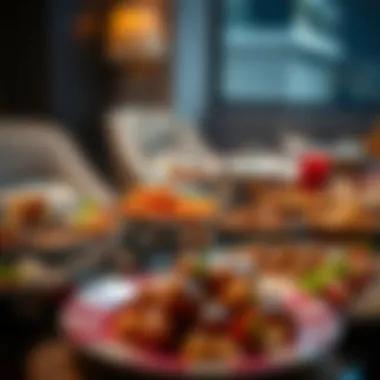
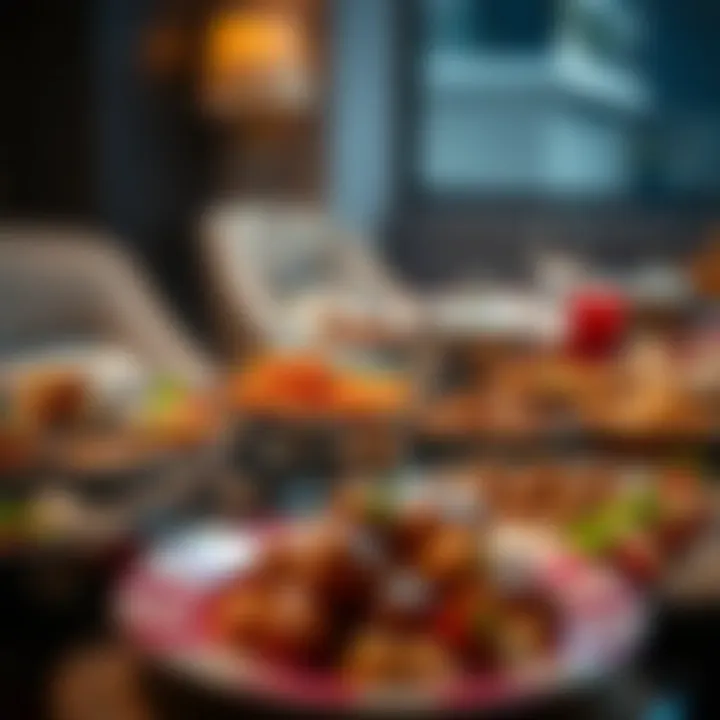
Intro
In the heart of Dubai, the sun sets over a bustling city, casting long shadows on skyscrapers and ancient traditions alike. This is not just any ordinary evening; it marks the arrival of iftar, the much-anticipated meal that breaks the fast during Ramadan. For many, iftar represents more than just food; it signifies a culture where community and culinary delights intertwine seamlessly.
As the clock strikes that special hour, streets pulsate with life, and the tantalizing aromas wafting from local eateries and lavish hotels herald the spirit of togetherness. Families, friends, and even strangers gather around tables, sharing not only meals but stories and laughter. The iftar experience in Dubai today is a narrative woven through time, where each bite captures the essence of shared heritage, blended with contemporary flair.
This comprehensive guide will delve into the diverse offerings and cultural significance of iftar in Dubai. We’ll explore everything from the culinary options that are available to unique locations where iftar is celebrated. Through this journey, we aim to enhance your understanding of how this cherished meal marries tradition with modernity.
Intro to Iftar
The practice of iftar holds significant cultural and spiritual resonance, particularly in Dubai, where it seamlessly marries tradition with the modern lifestyle. This introductory section aims to unpack the essence of iftar, emphasizing its importance not only as a meal but as a social phenomenon in the holy month of Ramadan.
Definition and Significance
Iftar, originating from the Arabic word "fatr,” meaning "to break the fast,” is observed daily during Ramadan, marking the moment when Muslims can eat after a day of fasting from dawn until sunset. This meal commences at the sound of the call to prayer (adhan), a signal which evokes feelings of anticipation and community among those participating. It is customary to break fast with dates and water, symbolizing a connection to the traditions established by the Prophet Muhammad.
Beyond the food, iftar serves as a reminder of the importance of humility and compassion. Sharing meals with family, friends, and even strangers fosters a sense of belonging and unity. For many expatriates and locals alike, these gatherings symbolize the heart of social intertwining in a predominantly multicultural city. The warmth of iftar not only nourishes the body but also enriches the spirit, making it a cherished ritual.
Historical Context
Historically, iftar has deep roots in Islamic tradition, tracing back to the time of the Prophet Muhammad in the 7th century. The act of fasting and then breaking the fast evolved from personal discipline to a communal celebration. Over centuries, the practice has adopted unique flavors and customs reflective of local culture. In Dubai, this has particularly flourished due to its cosmopolitan nature.
From its origins in the simplicity of sharing dates and water, iftar has transformed into a lavish experience replete with a variety of dishes that showcase culinary heritage from around the world. In modern-day Dubai, hotels and restaurants often craft large buffet spreads that elevate this ancient tradition into a celebration of culinary artistry. The blending of old and new practices highlights the dynamic nature of Dubai’s society, creating an intriguing tapestry that represents both historical and contemporary influences.
Thus, the significance of iftar transcends mere sustenance; it is a reflection of social values, cultural continuity, and community spirit, making it a vital aspect of life during Ramadan in Dubai.
Iftar Traditions in Dubai
Iftar, the meal that breaks the fast during Ramadan, is a cornerstone of cultural practices in Dubai, merging family values with culinary artistry. This section delves into the rich tapestry of iftar traditions in the city, highlighting not just what is served, but how these meals foster connections and community spirit. In Dubai, iftar is more than a meal; it embodies a gathering of souls, a celebration of generosity, and a chance to share both food and moments.
Culinary Practices
The culinary landscape of iftar in Dubai is as diverse as the city itself. As the sun dips below the horizon, a medley of aromas wafts through the air, signaling the commencement of a cherished ritual. Traditional dishes like dates, often paired with a delicate glass of water, are essential starters, serving both nourishment and significance. Dates are known as a break in the fast, not just for their sweetness but also for their nutritional value, providing an immediate energy boost after a long day.
Beyond the sweet beginning, iftar boasts a remarkable array of dishes rooted in both local customs and international influences. Hearty lamb ouzi, a dish made from spiced rice and slow-cooked lamb, is a particular favorite. As families gather, they might also enjoy rich lentil soups and vibrant salads, balancing the heavy flavors with fresh ingredients. Add to this the samosas—crispy, stuffed pastries—and one’s taste buds are in for a ride.
Yet, the experience of iftar does not stop at the food. Each dish holds a story, while every bite reflects the city's rich cultural tapestry. Cooking classes have become a trendy activity leading up to Ramadan, where both locals and expatriates learn to prepare traditional dishes, grounding themselves in the culinary practices that define this special month.
Social Gatherings
Iftar in Dubai is emblematic of togetherness, transcending mere sustenance to create treasured social gatherings. Communities gather in various venues, from the grandeur of luxurious hotels to intimate family homes. This meal is a time when friends and families come together to share not just food but laughter and cherished stories, strengthening bonds that might grow distant amidst the hustle and bustle of daily life.
Many families prepare large feasts, often inviting friends and neighbors to join. It's customary to leave an empty chair at the table, symbolizing welcome for anyone in need. Such acts of generosity reflect the core values of Ramadan—compassion, charity, and community. On a larger scale, Dubai's public iftar events are often held in parks and community centers, where hundreds gather to enjoy complimentary meals, fostering a sense of unity among the city's diverse population.
Furthermore, expatriate communities host iftar dinners that showcase their culinary roots, blending traditional dishes from their home countries with local flavors. This cross-cultural exchange enriches the iftar experience, highlighting how food can connect people from different backgrounds.
"In Dubai, iftar is not just about breaking the fast; it’s about breaking down barriers and building bridges across cultures."
Today’s Iftar Events
The Iftar event during Ramadan is more than just breaking a fast. In Dubai, it’s a cultural gathering that reflects the essence of community, culinary exploration and a celebration of tradition amidst a modern backdrop. Today's Iftar events take on new dimensions, allowing locals and visitors to immerse themselves in the rich tapestry of flavors and fellowship that define this special month.
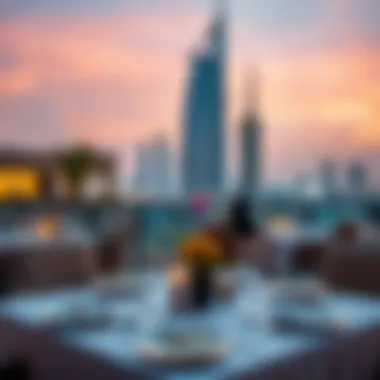
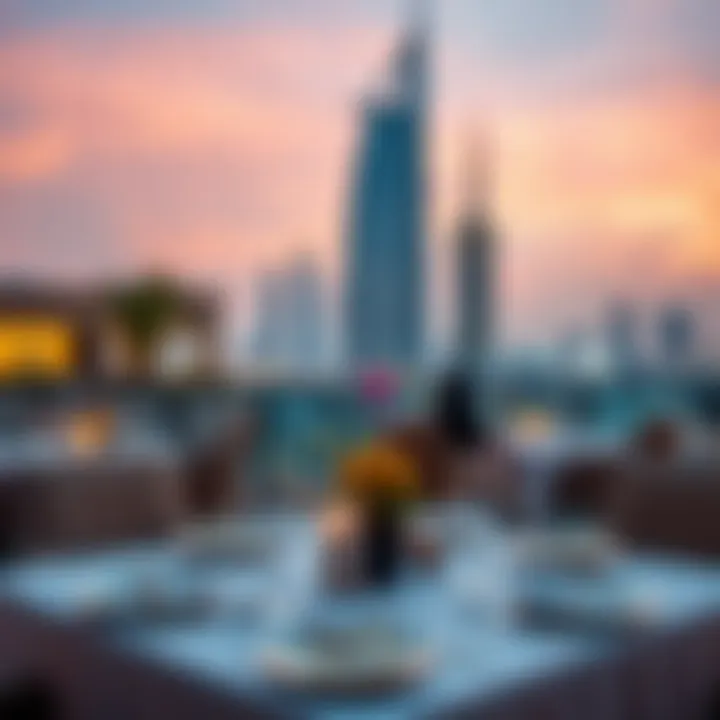
Popular Venues
Hotels
Hotels in Dubai play a pivotal role during Ramadan, serving as popular spots for Iftar gatherings. These venues often offer lavish buffets, showcasing both traditional and contemporary dishes. The key characteristic of hotels is their ability to provide a luxurious ambiance, making the dining experience more memorable. Notably, hotels like the Burj Al Arab offer not just food but a unique atmosphere paired with stunning views, providing a beneficial choice for families and groups.
A unique feature of hotels is their diversity in offerings; they often cater to various dietary needs, incorporating vegetarian and gluten-free options. However, the downside can sometimes be the price, as hotel buffets tend to be on the higher spectrum, possibly limiting some families' participation.
Restaurants
Dubai’s restaurant scene also shines brightly during Ramadan with many establishments crafting special Iftar menus. These venues focus on delivering authentic dishes, rich in spices and flavor. The special aspect of restaurants is their character and local charm, allowing diners to experience Iftar in a more relaxed and personalized setting. Through special promotions and themed nights, restaurants attract patrons looking for a cozy environment to enjoy their meals.
Unique to restaurants is their ability to innovate traditional dishes, blending various cuisines into the Iftar experience, such as Lebanese mezze or Indian biryani. On the flip side, these options might not be as extensive as those at hotels, sometimes limiting choices for larger groups.
Community Centers
Community centers in Dubai provide a grassroots approach to Iftar, emphasizing inclusiveness and social bonding. These centers often host community Iftar events that are open to everyone, fostering a spirit of togetherness that aligns perfectly with the essence of Ramadan. The key trait of community centers is the atmosphere of familiarity and connection, making it an ideal option for those looking to meet new people and engage with diverse communities.
What sets these centers apart is their affordability; many provide Iftar at minimal or no costs. This ensures everyone in the community has access to the Iftar experience. However, the trade-off can sometimes be a more basic menu compared to the offerings at hotels or upscale restaurants, which may not appeal to those seeking a more lavish dining experience.
Special Offers
Buffet Listings
Buffet listings during Ramadan provide an excellent opportunity to sample a variety of dishes in one sitting. Many establishments create extensive buffets designed for Iftar, allowing diners to indulge in an array of cuisines. The highlight of these buffets is their all-you-can-eat nature, offering value for money as patrons can discover flavors from different cultures.
A unique feature of buffets is the communal dining experience. Families and friends gather around large tables filled with dishes, creating a vibrant atmosphere. On the downside, buffet settings can lead to waste if not managed properly, and overcrowding may detract from a serene dining experience.
Takeaway Options
Takeaway options for Iftar cater to those who prefer dining at home or are on-the-go. Many restaurants and hotels provide special takeaway menus with convenient packaging. The key characteristic here is flexibility; customers can enjoy Iftar in their preferred setting, be it at home, in a park, or elsewhere.
An appealing aspect of takeaway offerings is their adaptation to busy lifestyles, allowing individuals to enjoy the Iftar feast without the need for extensive preparation. However, the challenge can be ensuring the same level of quality and presentation as a dine-in experience, especially for intricate dishes which might not travel well.
As many embrace modernity during Ramadan, the essence of togetherness remains at the heart of today’s Iftar events in Dubai.
In summary, today's Iftar events in Dubai bridge tradition and modernity. With diverse venues, unique experiences, and special offers, everyone can find a setting that suits their taste and preferences, ensuring that the spirit of Ramadan is alive and vibrant.
Culinary Highlights for Iftar
The culinary experience during iftar is as vibrant as Dubai itself. From revered traditional dishes to modern experimental cuisine, the options are limitless. Focusing on the food not only enhances the sense of community but also highlights the city's cosmopolitan nature. Each dish tells a story, blending flavors from various cultures that make their mark in this magnificent city.
Traditional Dishes
Dates and Water
In many cultures, especially in the Middle East, breaking the fast begins with dates and water. This age-old tradition carries immense significance; the sweetness of dates provides a quick source of energy after a long day of fasting. The hydration aspect of water ensures that the body begins to rehydrate smoothly. The natural sugars in dates, like fructose and glucose, make them an ideal choice for replenishing energy levels quickly.
The distinctive feature of this pairing lies in its simplicity. Unlike extravagant meals that require time and effort to prepare, dates and water epitomize authenticity and accessibility. This underscores the essence of iftar: a moment of pause, reflection, and gratitude. However, one should be cautious; consuming large amounts of dates swiftly can lead to sugar spikes, which might not be ideal for everyone.
Soups and Salads
Another staple of iftar is a variety of soups and salads. These dishes not only offer a nourishing complement to the meal but also provide a refreshing balance to heavier courses. For instance, lentil soup is a popular choice, packed with protein and fiber, making it both filling and healthy. Salads, often laden with fresh vegetables and zesty dressings, offer a vibrant crunch that rejuvenates the palate.
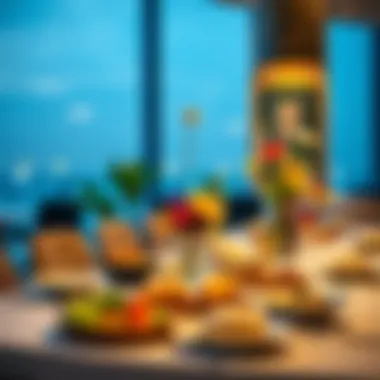
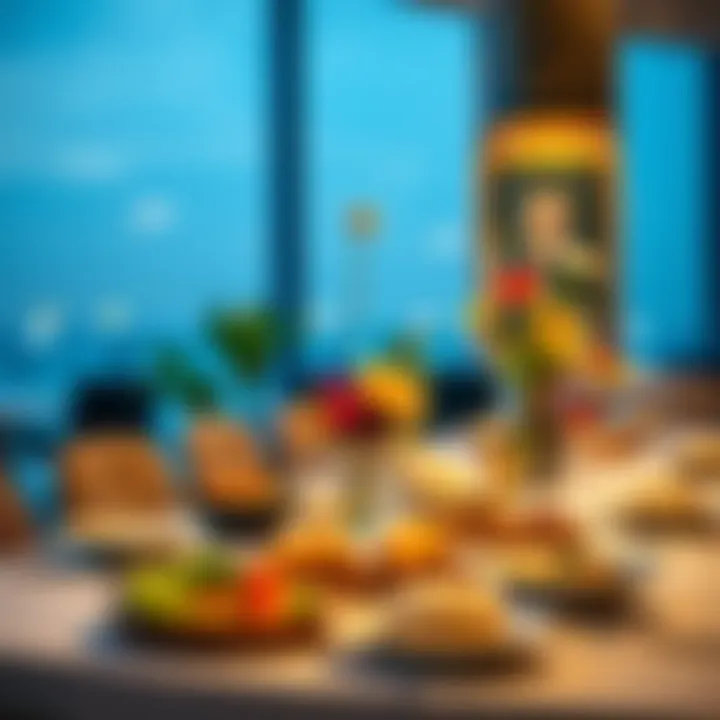
What makes soups and salads particularly advantageous is their versatility. From chilled cucumber soup to vibrant tabbouleh, they can be tailored for diverse taste preferences. This variety helps cater to both traditionalists and modern food enthusiasts, ensuring everyone can find something satisfying. Nevertheless, relying too heavily on creamy soups may not align with health goals, so opting for light broths is advisable.
Modern Twists
International Cuisine
As Dubai stands at the crossroads of the world, the inclusion of international cuisine in iftar menus is inevitable. Influences from Asian, European, and African cuisines create a delightful medley of flavors that entice both locals and expatriates. Offering dishes like sushi rolls or pasta alongside traditional favorites showcases the city's modern culinary landscape.
The key characteristic of this trend is its inclusivity. It represents the diverse tapestry of residents and visitors in Dubai, allowing various cultures to come together in celebration. For instance, many restaurants have started offering fusion dishes that combine traditional Middle Eastern flavors with Western techniques, like shawarma tacos. This exploration of flavors is a crowd-pleaser. Yet, one must ensure that the essence of iftar is not lost amid the experimental approaches, maintaining the spirit of the Ramadan meal.
Gastronomic Innovations
Gastronomic innovations have taken the iftar experience to unprecedented heights. Chefs experiment with textures, flavors, and presentations that transform simple dishes into extraordinary culinary art. Picture a dessert that combines traditional baklava elements with modern deconstruction—an extraordinary blend that not only excites the taste buds but also provides a visual feast.
The charm of these innovations lies in their ability to invite guests into a world of culinary creativity while honoring cultural practices. Innovative approaches encourage diners to step out of their comfort zone, opening up new possibilities in how traditional meals can be appreciated. Nevertheless, it's essential to appreciate that not every innovation hits the mark; some may veer too far from tradition, losing their cultural significance in the process.
In summation, the culinary highlights for iftar in Dubai offer a rich tapestry of experiences. They bring together history and modernity, tradition and innovation, inviting everyone to leave their culinary comfort zones and dive into something new—while still cherishing the comforting old.
This melting pot of flavors not only enhances the dining experience but also symbolizes the spirit of Ramadan in Dubai.
For those interested in further exploring culinary delights during iftar, consider visiting websites like en.wikipedia.org or foodnetwork.com for more recipes and insights.
Cultural Events and Activities
During the holy month of Ramadan, Iftar is more than just breaking a fast; it's a pivotal cultural observance that strengthens ties within communities. In Dubai, the custom of sharing meals transcends ethnic and cultural boundaries, making it a beautiful reflection of the city's diversity. Events and activities during this period not only celebrate the act of fasting but also serve as platforms for art, music, and community participation, encouraging engagement in ways that foster relationships and mutual understanding.
Art and Music Showcases
Art and music play a crucial role in enhancing the atmosphere of Iftar celebrations. Many venues across Dubai choose Ramadan as a perfect occasion to host special exhibitions and performances. Local artists bring their work to life, showcasing traditional artworks alongside contemporary pieces. These showcases are often accompanied by live music, ranging from classical Arabic tunes to modern instrumental pieces. This blend creates an ambiance that encourages reflection and connection, making the meal an even richer experience.
Besides visual arts, cultural performances often feature local musicians playing the oud (a traditional stringed instrument) or engaging in poetry recitations, which can truly elevate the spirit of the evening. These events not only entertain but also educate attendees about the cultural heritage of the UAE, reminding everyone of the art's powerful role within the community.
Community Engagement
Volunteering
Volunteering stands out during Ramadan in Dubai, becoming a beacon of hope and compassion. Many organizations actively seek volunteers to help distribute iftar meals to those in need. This act of kindness not only fulfills a social responsibility but brings people together for a common purpose. Listing food drives and community kitchens on websites and social media helps maximize participation, ensuring meals reach as many as possible.
The rewarding nature of volunteering offers volunteers unique insights into the diverse fabric of Dubai's society. These experiences allow individuals to not just break bread with others but also to engage deeply with the community, enhancing understanding and compassion.
The unique feature of volunteering during Ramadan is its ability to combine charitable acts with cultural enrichment. It’s not merely about providing food; it's a moment where volunteers can share stories, listen to the experiences of others, and feel a strong sense of belonging. The opportunity to impact lives positively is not just fulfilling—it's empowering, reinforcing the idea that every contribution, big or small, can lead to significant changes in the community.
In summary, cultural events and activities surrounding Iftar go beyond the meal itself. They serve as essential threads in the social fabric of Dubai. By partaking in the arts and engaging in community service, individuals can foster both personal and collective growth during this revered month.
Health Aspects of Iftar
Iftar, the meal that breaks the fast during Ramadan, is not just about satisfying hunger after a long day without food; it's a blend of nutrition, culture, and community. Understanding the health aspects of iftar is critical as it highlights not only the physical but also the emotional and spiritual benefits this meal confers. It’s essential to consider the balance among food choices and hydration, which can significantly affect how individuals feel and function during the holy month.
Nutrition Considerations
Eating after hours of fasting requires a thoughtful approach. During iftar, one's plates should be a colorful palette of food that reflects the essential nutrients the body needs after a day of fasting. Here are some key nutritional considerations to prioritize:
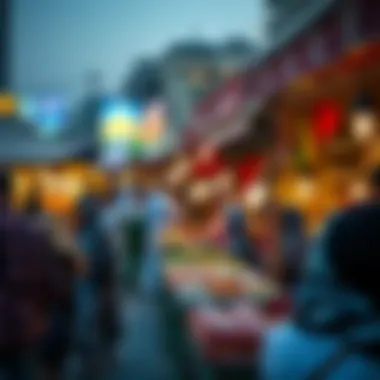
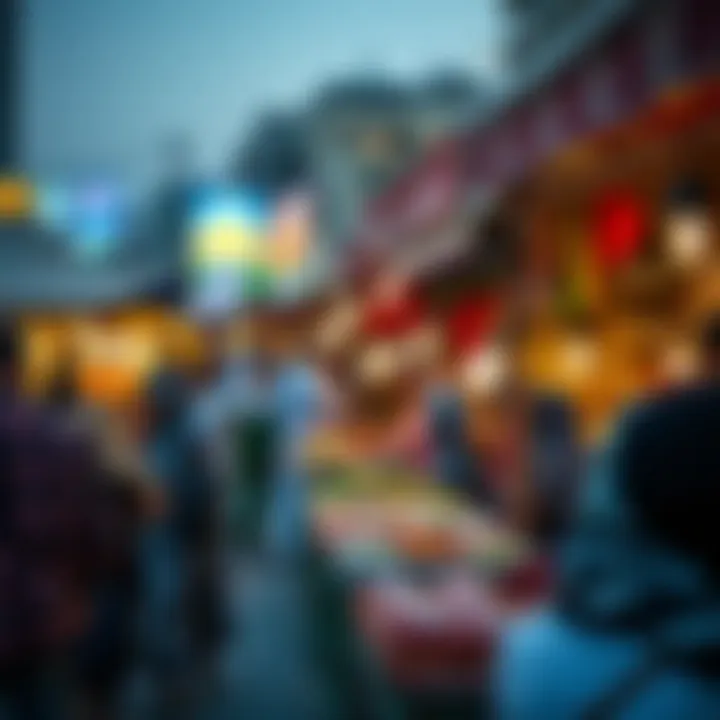
- Focus on Nutrient-Dense Foods: Opt for colorful fruits and vegetables. They are rich in vitamins and minerals. Consider adding things like spinach, carrots, and avocados. Fruits like watermelon and oranges can help reinstate energy levels quickly.
- Incorporating Whole Grains: Instead of refined grains, go for whole grains. Foods such as brown rice or whole-grain bread provide better fiber, which promotes digestion.
- Balance Protein Sources: Chicken, fish, legumes, and dairy can serve as excellent protein options. They help build and repair tissues and are crucial for sustained energy levels.
- Moderation with Sweets: It’s tempting to go overboard with traditional sweets like kataifi or baklava. While it's a part of the cultural experience, moderation is vital to avoid blood sugar spikes.
"The best meals for iftar are ones that rejuvenate both body and spirit, making you feel grounded and nourished."
Hydration Tips
Staying hydrated is equally important during iftar, particularly in Dubai’s warm climate. Here are some effective hydration tips to remember:
- Start with Water: According to health professionals, starting your meal with water helps prepare the digestive system for food. Keep a glass or bottle handy throughout the evening.
- Include Hydrating Foods: Functions like watermelon, cucumbers, and yogurt not only satisfy hunger but also contribute to daily water intake. It's a smart way to quench thirst while eating.
- Avoid Caffeinated Beverages: While a cup of coffee or tea may seem appealing, caffeine can lead to dehydration. Opt for herbal teas or infused waters with mint and lemon instead, which can be refreshing and hydrating.
- Plan Between Meals: It’s advisable to drink water gradually throughout the evening rather than guzzling it. Aiming for at least eight glasses between iftar and suhoor (the pre-dawn meal) can support optimal hydration levels.
These health aspects of iftar outline how a thoughtful approach to nutrition and hydration can enhance the overall experience of Ramadan. Making conscious decisions about what to eat and how to hydrate can lead to a more fulfilling and enjoyable iftar, ultimately benefiting both body and soul.
Iftar Beyond the Meal
Iftar is not just a meal; it's a profound cultural event that transcends the act of eating. In Dubai, it intertwines spiritual reflections and the fostering of family and community bonds, making it a noteworthy aspect of Ramadan. The significance of Iftar extends into various dimensions of life, offering moments for introspection and connection with loved ones and the larger community.
Spiritual Reflections
Iftar serves as a critical juncture for spiritual reflection. As the day draws to a close, the anticipation builds not only for the meal itself but for the chance to pause and appreciate the blessings one has. This time of day resonates with meaning, where individuals often take a moment to reflect on personal growth and the tenets of their faith.
Many choose to delve deeper into their spirituality during Iftar. Whether it's through prayer, reading the Quran, or simply meditating on their experiences, the act of breaking the fast becomes a sacred ritual. When people gather to enjoy delicious dates and water, there's often an unspoken sense of gratitude in the air. The transition from fasting to feasting symbolizes more than just food; it's an opportunity to express thanks for sustenance and remind oneself of the importance of compassion, charity, and empathy towards others.
Consider this:
- It’s common for families to share stories from their day, reflecting on their challenges and the lessons learned.
- Spiritual discussions may arise, leading to a deeper understanding of one’s values and beliefs.
guidestones like these can help reinforce a sense of purpose and identity.
Family and Community Bonds
The communal aspect of Iftar is perhaps one of its most cherished elements. Families often come together to partake in this meal, reinforcing familial ties. Shared laughter, stories, and food create lasting memories, often deepening relationships. In a bustling metropolis like Dubai, this connection becomes even more vital, providing a comforting reminder of home and heritage amid the fast pace of city life.
Beyond immediate family, Iftar can extend its embrace to friends and even strangers. It's common for neighborhoods to host collective Iftar gatherings. These events break down barriers and foster a sense of unity.
Key points:
- Community Spirit: Local mosques and community centers frequently organize large Iftar meals, inviting anyone who wishes to join. This inclusivity strengthens the community fabric and reflects the values of generosity and hospitality in Islamic culture.
- Volunteering Opportunities: Many individuals participate in charity during Ramadan by preparing meals for the less fortunate or volunteering at local food drives. Engaging in these activities during Iftar not only nourishes the body but also feeds the soul through altruism.
Overall,
End
As we gather all the threads of our exploration into iftar today in Dubai, it becomes clear that this experience is not merely about the meal. It spans wider than the sumptuous dishes and traditional dates. It embodies a vibrant tapestry of cultural resonance and communal spirit. Amid the hustle and bustle of modern life, iftar remains a time for reflection, connection, and celebration, bringing together people from various walks of life.
Reflecting on Today’s Iftar Experience
The significance of today's iftar experience stretches deep into the hearts of those who partake. For expatriates and locals alike, it serves as an important reminder of the traditions that define the rich cultural landscape of Dubai. Whether one finds joy in sharing a table laden with food or in engaging in meaningful conversations, each moment is imbued with a sense of belonging. The flavors of traditional dishes, crafted with precision and care, resonate not just with palates but also echo stories passed down through generations.
People often share their experiences through social media platforms, posting pictures of their iftar setups and showcasing how they’ve blended personal traditions with the city’s evolving culinary scene. This practice is akin to digital storytelling, where each post narrates an individual’s journey through Ramadan and their unique approach to iftar. It encapsulates a community spirit that honors both the old and the new, fostering a connection among residents, expatriates, and visitors.
Looking Ahead to Future Festivities
As Ramadan gives way to its conclusion, the anticipation for future festivities lingers in the air. This period is not just a countdown to Eid al-Fitr; it’s also a bridge connecting cultural practices with evolving culinary trends. Each iftar celebrated this year sets the stage for what’s to come in future years—new dishes, innovative culinary styles, and even more significant community engagement.
In light of this, the city may see a surge in hybrid events, merging traditional iftar gatherings with contemporary dining experiences that cater to a diverse audience. For instance, one can envision pop-up iftar events that draw from international cuisines, offering tantalizing twists on classic dishes.
Moreover, with Dubai's commitment to nurturing a rich cultural milieu, steps are being taken to incorporate sustainability and health awareness into future celebrations. The focus on nutritious options and waste reduction will enhance the overall iftar experience for all.
In summary, the reflections on today’s iftar and the possibilities for tomorrow emphasize the importance of maintaining cultural heritage while embracing innovation. As we look ahead, the journey through iftar will continue to thrive and evolve, creating dynamic narratives within the ever-enriching backdrop of Dubai.











